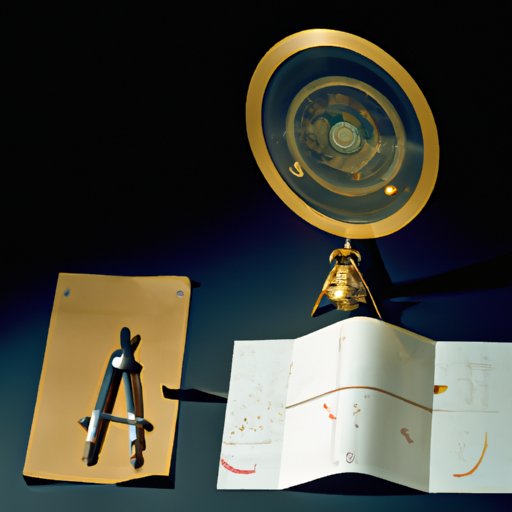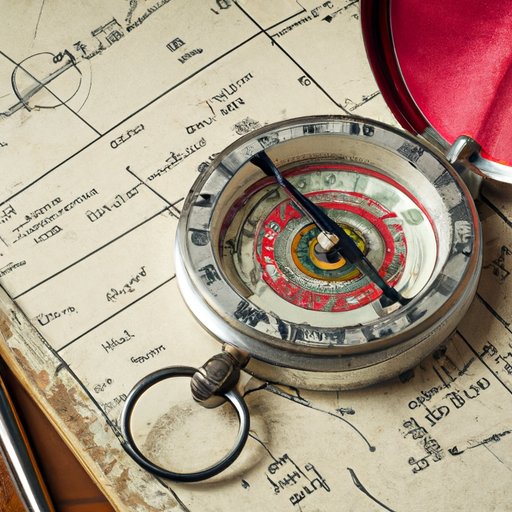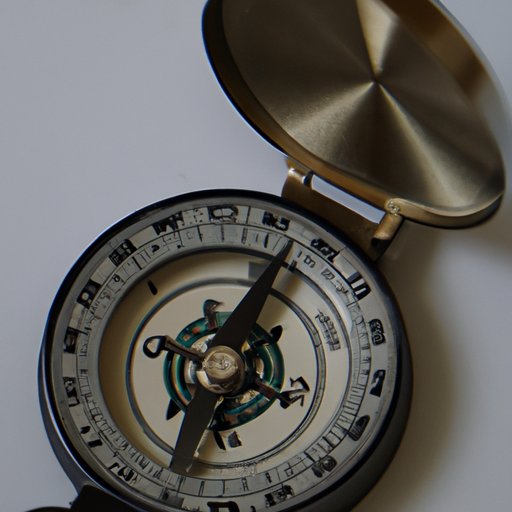Introduction
A compass is a navigational tool that uses a magnetic needle to point towards the Earth’s North Pole. For centuries, the compass has been essential for navigation, helping sailors, explorers and adventurers find their way across land and sea. But where did it come from, and what impact has it had on society? This article will explore the invention of the compass, from its development in ancient China through to its impact on exploration and society today.

A Historical Overview of the Invention of the Compass
The first compasses were invented by the Ancient Chinese around 2,000 years ago. According to the Han Dynasty National Library, “the invention of the south-pointing spoon, the precursor of the compass, dates back to the Warring States period (476-221 BCE)”. This primitive device was made up of a spoon-shaped piece of metal, which was balanced on a pivot and would always point south when left undisturbed. The device was known as the south-pointing spoon or south-pointing chariot, and was used to help Chinese military commanders navigate their way around the battlefield.
The invention of the south-pointing spoon was followed by the invention of the magnetic compass in the Song Dynasty (960-1279). According to historian Joseph Needham, “the earliest definite reference to the use of the mariner’s compass in navigation occurs in Zhu Yu’s Pingzhou Ketan of 1119–1125”. This early version of the compass was made up of an iron needle that was magnetized by striking it against a lodestone, which enabled it to point north. From this point onwards, the compass evolved rapidly, with new designs and features being added over time.
By the 13th century, the compass had spread to Europe, where it quickly gained popularity among sailors and explorers. During this time, Europeans developed and improved upon the design of the compass, adding features such as the lubber line, which allowed sailors to easily read the direction in which the needle was pointing. By the mid-15th century, the compass had become an essential tool for navigation and exploration, and was widely used by European sailors.
Exploring the Significance of the Compass in Navigation and Exploration
The invention of the compass revolutionised navigation and exploration. Prior to the invention of the compass, sailors relied on crude tools such as the astrolabe and quadrant to measure the angle of the sun or stars in order to determine their position. This method was inaccurate and unreliable, making it difficult for sailors to accurately chart their course. The introduction of the compass made navigation significantly easier and more reliable, as it provided sailors with a simple and effective way to determine their location and direction.
The compass also played a key role in the Age of Exploration, enabling sailors to travel further than ever before. According to a study by the University of Cambridge, “the compass enabled explorers to sail around the world and discover new lands, opening up opportunities for trade, conquest, and colonisation”. For example, Christopher Columbus famously used the compass to navigate his voyage to the New World in 1492.

Analysing How Different Cultures Used the Compass in Their Own Ways
The compass was used by many different cultures in different ways. In medieval Europe, sailors used the compass to navigate the seas, while monks and scholars used it to map the night sky. Meanwhile, in other parts of the world, such as China, the compass was used for divination and fortune-telling. According to the Encyclopedia Britannica, “Chinese geomancers used the [magnetic] compass to locate auspicious sites for graves and buildings, a practice called feng shui”.
In addition, the compass was used by some cultures as a spiritual tool. According to anthropologist David Yaden, “many Native American tribes used the compass as a symbol of the four cardinal directions, which they believed were connected to spiritual forces”. The compass was also used by some cultures as a symbol of protection, with sailors carrying compasses to ward off evil spirits at sea.

Investigating the Impact of the Invention of the Compass on Society
The invention of the compass had a profound effect on society, leading to a number of technological advancements and societal changes. One of the most significant impacts of the compass was the advancement of maritime technology. According to historian John Leddy Phelan, “the compass ushered in a new era of navigation and exploration, allowing ships to venture out into unknown waters with greater confidence”. This in turn led to the growth of international trade and the spread of goods and ideas across the world.
The invention of the compass also had a major impact on exploration and discovery. Without the compass, it would have been impossible for explorers such as Christopher Columbus to make their voyages of discovery. As historian William H. McNeill put it, “the compass made possible the great age of exploration and discovery in the 15th and 16th centuries”. This in turn paved the way for the modern world we live in today.
Conclusion
The invention of the compass was a major turning point in human history. It enabled sailors and explorers to navigate the seas with greater accuracy and confidence, paving the way for the Age of Exploration and Discovery. It also had a profound effect on society, leading to advances in maritime technology and the spread of goods and ideas across the world. The compass may be a simple device, but its invention changed the course of history.
(Note: Is this article not meeting your expectations? Do you have knowledge or insights to share? Unlock new opportunities and expand your reach by joining our authors team. Click Registration to join us and share your expertise with our readers.)
